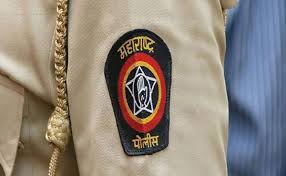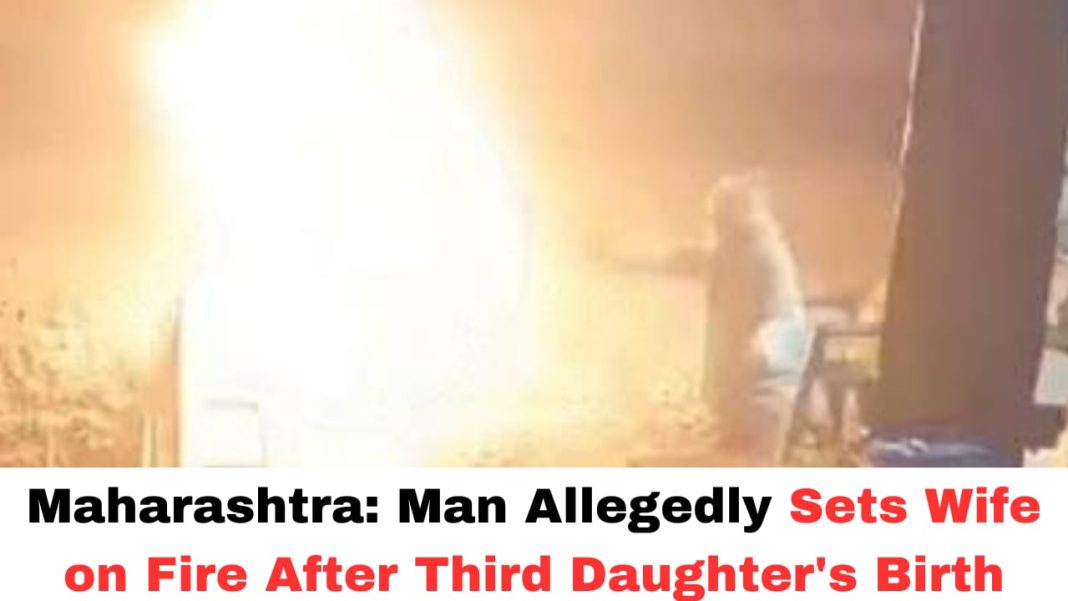Digital News Guru Maharashtra Desk:
The incident, which unfolded in the Parbhani district, highlights the persistent issues of gender bias and domestic violence that continue to plague certain sections of Indian society.
Maharashtra’s Parbhani district: The Incident
In a tragic incident in Maharashtra’s Parbhani district, a 32-year-old man named Kundlik Uttam Kale allegedly set his wife, Maina, ablaze after she gave birth to their third daughter. The incident occurred on Thursday night in Gangakhed Naka, approximately 520 kilometers from Mumbai.
According to reports, Kale had a history of taunting his wife over not bearing a son. During a heated argument, he purportedly poured petrol on Maina and set her on fire. Despite neighbors’ efforts to extinguish the flames, Maina succumbed to her injuries while being transported to the hospital.

The local police have arrested Kale on charges of murder. This incident underscores the persistent issue of gender bias and the preference for male children in certain parts of India, leading to extreme acts of violence against women.
Preliminary investigations suggest that the act was driven by frustration and deep-seated gender bias, as Kale reportedly had a history of taunting his wife over not bearing a son. The motive appears to stem from societal pressures and personal intolerance towards female offspring, a reflection of the broader issue of gender preference in certain parts of India.
Contextualizing Gender Bias in India
The Maharashtra incident is not an isolated case but rather a grim manifestation of a widespread societal problem. Gender discrimination in India has deep roots, influenced by cultural, economic, and social factors that favor male children over female. This bias is often perpetuated by the belief that sons are carriers of the family lineage and providers of financial security, while daughters are viewed as financial burdens due to practices like dowry, despite legal prohibitions against such customs.
The preference for male children has led to alarming practices such as sex-selective abortions, contributing to skewed gender ratios in several states. According to the 2011 Census, India’s sex ratio stood at 940 females to 1,000 males, a statistic that underscores the extent of gender imbalance. While initiatives like “Beti Bachao, Beti Padhao” (Save the Daughter, Educate the Daughter) aim to address these disparities, incidents like the one in Maharashtra reveal the ongoing challenges in changing deep-seated societal norms.
The Role of Domestic Violence and Patriarchy
The tragic act committed by Kale also underscores the intersection of gender bias and domestic violence. Domestic violence remains a pervasive issue in India, despite legislative measures such as the Protection of Women from Domestic Violence Act of 2005. A report by the National Crime Records Bureau (NCRB) in 2020 highlighted that a significant proportion of crimes against women are linked to cruelty by husbands and in-laws.

In many households, women face physical, emotional, and psychological abuse, particularly when they do not conform to patriarchal expectations. The Maharashtra case exemplifies how patriarchal oppression can escalate into extreme violence when compounded by societal pressures to produce male heirs.
Legal and Social Implications
The arrest of Kundlik Uttam Kale on charges of murder marks the beginning of a legal battle that will likely draw significant public and media attention. Legal experts emphasize the importance of ensuring that justice is served swiftly to deter similar acts of violence. However, legal recourse alone is insufficient to eradicate the root causes of such heinous crimes.
Social reform is imperative to address the underlying issues of gender discrimination and domestic violence. Comprehensive strategies that include education, community engagement, and empowerment of women are essential to bring about lasting change. Empowering women through education and financial independence can help mitigate the pressures that lead to domestic abuse and gender-based violence.
Public Outcry and Demand for Change
The Maharashtra incident has sparked widespread outrage on social media and among advocacy groups. Citizens and activists are calling for stronger measures to combat gender-based violence and discrimination. There is a collective demand for societal transformation to value and protect women and girls, ensuring that no one has to endure such tragedies in the future.
Public discourse has also highlighted the role of community leaders and local authorities in fostering an environment that rejects gender bias. Efforts to engage religious and community figures in promoting gender equality can play a crucial role in changing societal attitudes.
Moving Forward: Steps Towards Equality
Addressing the issue of gender discrimination requires a multifaceted approach:
- Strengthening Legal Frameworks: Ensuring the effective implementation of existing laws and introducing stricter penalties for gender-based violence can act as a deterrent.
- Educational Initiatives: Promoting gender equality through education can help dismantle harmful stereotypes and biases from an early age.
- Economic Empowerment: Providing women with access to education and economic opportunities can reduce their dependence and vulnerability to abuse.
- Community Engagement: Involving community leaders in advocacy and awareness campaigns can help shift societal norms towards greater acceptance and respect for women.
- Support Systems: Establishing robust support systems, including shelters, counseling, and legal aid for victims of domestic violence, is crucial for their protection and rehabilitation.
Conclusion
The tragic incident in Maharashtra serves as a stark reminder of the pervasive gender biases that continue to affect women’s lives in India. While legal measures and awareness campaigns are steps in the right direction, there is an urgent need for comprehensive societal change to eliminate the preference for male children and eradicate domestic violence. Empowering women, educating communities, and enforcing legal protections are essential to ensure that such tragedies become a thing of the past. As India strives towards gender equality, the collective efforts of government, civil society, and individuals will be pivotal in creating a more just and equitable society for all.
You May Also Read: With 1,719 Crore in 23 Days, Pushpa 2: The Rule Inches Closer to Baahubali 2’s Record









